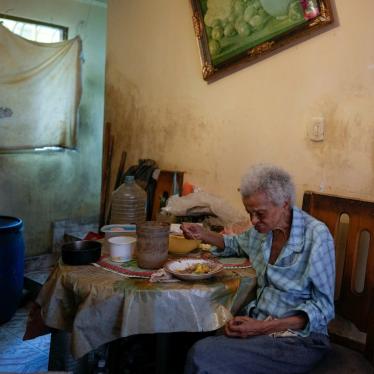“I would like a life where I can buy butter, jam, and tomato sauce.”
It doesn’t seem like too much to ask for, but for a soft-spoken 80-year-old, Themba Magqadaza, it’s a distant reality. His monthly R2,010 Older Persons Grant, sometimes known as the Old Age Grant, is the only income for himself, his unemployed 28-year-old-son, and his 14-year-old grandson.
Magqadaza, like many of his generation, spent a little more than half a century of his life under apartheid, which denied him a decent education, decent work, and the ability to save for older age.
As food prices rise, many older people, and those they support, are going hungry, as are others living in marginalized situations across the country. After they pay rent, utilities, burial society and funeral plans, school fees, or transport for health care, little remains for food for one person, let alone a family.
“The groceries that we buy last a week-and-a-half and for the remainder of the month, we only have mealie meal, rice, and samp,” Magqadaza said.
The Older Persons Grant is an important pillar of South Africa’s social protection system, on which the country spends a relatively large portion of its GDP compared with other upper-middle income countries. In October, the government increased the Older Persons Grant by R10 per month to R1,990 for those 60-74 and to R2,010 for those 75 and older. However, with annual food inflation at 11.9 percent in September, this increase cannot keep the Magqadaza family’s hunger at bay.
Until the government conducts a full review and increases the Older Persons Grant so older people and their families can live and eat better, older people will not be able to enjoy their guaranteed rights, which only compounds the cumulative impact of apartheid. Given the number of people the Older Persons Grant supports, both young and old, increasing the grant would reach a large number of people and inject much needed cash into local economies.
Transportation and electricity prices are also steeply rising, with transport costs up by 17.9 percent in September from the previous year and electricity costs set to rise by 9.6 percent in 2022/23. With 60, or 65 at most, considered the normal retirement age and the government prioritizing the 66.5 percent youth unemployment, older people find it difficult to continue working if they wish—or need—to, leaving few options to increase their fixed grant income.
More than 70 percent of people 60 and older receive social grants, which is the only income for most and is now commonly used to support multiple generations of unemployed adult children and grandchildren. These older people endure inadequate standards of living, since fixing the house, replacing broken furniture and appliances, or buying new clothes are luxuries for someone living on R1,990-2,010 a month.
For some, a monthly or bimonthly food parcel from their local council or a charitable organization, or attending a daily lunch club, is how they survive. Every day, Magqadaza visits a service centre run by a non-profit organization in Dimbaza, which gets a monthly subsidy from the Eastern Cape Department for Social Development of just R250 per older person to cover the costs of food, recreational activities, administration, and nursing care. Older people often take the lunch they get at the centre home to share with their families.
Unfortunately, food parcels and daily lunch clubs are not available, or enough, for every older person. Some are forced to choose between going hungry or spiraling into debt that is hard to escape. Some borrow from family, friends, or neighbours or get credit at the local spaza. Others resort to loan sharks with exorbitant interest rates.
Magqadaza said that, because of the food shortages, every month, he has to borrow from a loan shark at 40 percent.
South Africa’s constitutional, regional, and international human rights obligations guarantee older people social security and an adequate standard of living, which should mean they have access to sufficient and nutritious food.
To meet these human rights obligations, the South African government should promptly reassess the Older Persons Grant to account for inflation so they can afford basic necessities as prices continue to rise.
But more will be needed to meet the needs of the older people and the family members who depend on them. The government should begin a comprehensive review of the system.
When I ask Magqadaza about his health, he tells me, “Even as I sit here, my body is sore, my shoulders. I know it’s stress.” And so, every month, he pays R450 he can’t afford to a doctor to treat his stress, stress that stems in part from the fact he is not guaranteed enough money to live with dignity and enjoy the little things in life: butter, jam, and tomato sauce.








